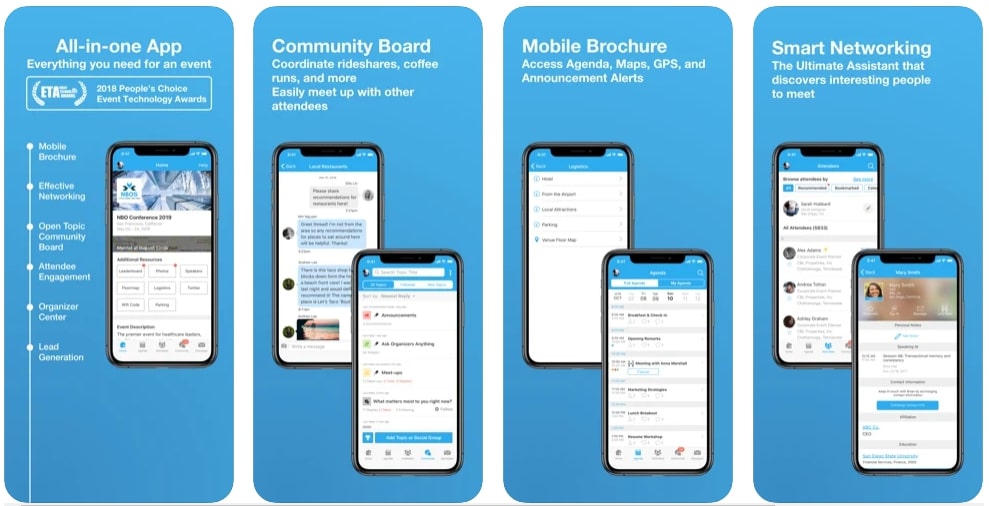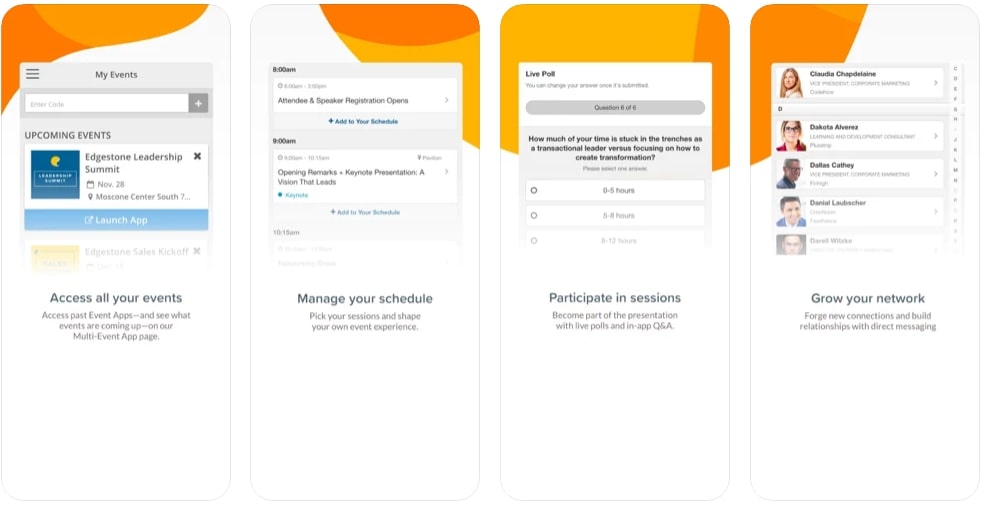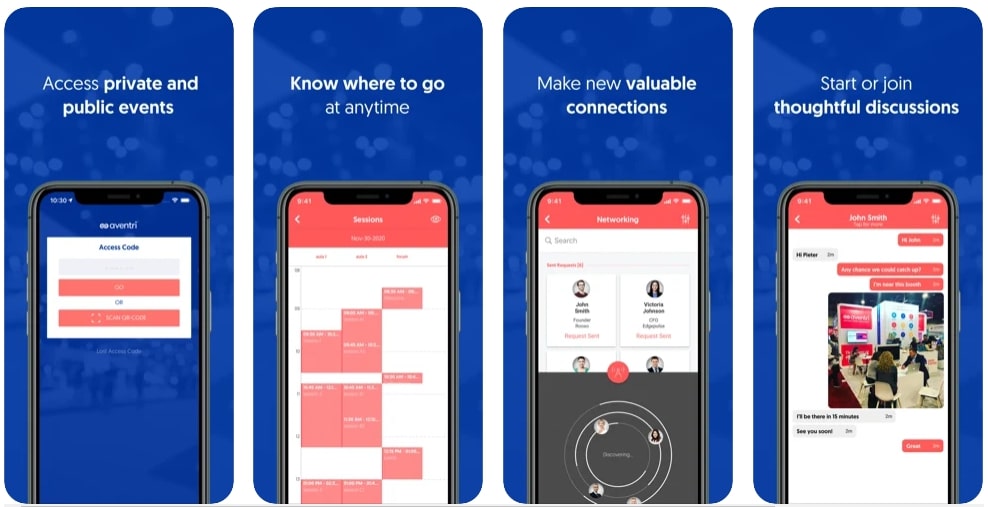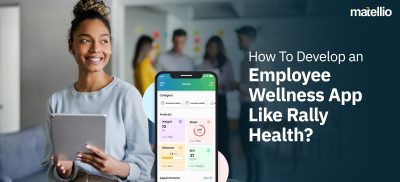
Socializing is the natural behavior of human beings since the beginning. We love going to events, organizing events, and socialize with either our known ones or make new friends. At any time of the day, there must be an event being held in any random part of the planet. These events can have different themes and purposes, but they all have one thing in common, they all benefit from the evolving technologies.
Today, you have got an app for everything, for checking emails, weather, news, banking, or socializing with your friends online. Event planning is a wide market in terms of opportunities and revenue generation. Event management app development is a hot topic in the market, as its popularity is flying off the charts. The figures associated with event planning apps look promising; if you are planning to build an event app, we will be discussing the process of its development in this blog.
What is an Event App?
Organizing an event comprises a number of complexities. An event app is a software application specially designed to deliver great efficiency and help in planning events regardless of the size. The core of any event is its management, and these apps help you manage these events with their efficient tools. Event apps can greatly enhance the experience of the attendees, while event planners can enhance their profit.
These apps are extremely advanced in terms of functionalities and features. Earlier, any event would have a significant attendance in case it delivered quality content or a theme to attract people of similar interests. Today, these event apps have changed the game completely. Now, you can inform the attendees about any last-minute changes or any updates right through the app. Event app developers are now more focused on integrating advanced features that go beyond the original idea and basic functions of informing the venue and the date of an event. The event management app development market is expected to surpass the mark of 15 billion US dollars by the year 2025, with a significant CAGR of 11.60 percent. Building an event app could be beneficial in the current times, considering the present market growth rate.
Stats and Benefits of the Event Management App Development
Events have evolved in terms of presentation since the year 2020. At the start of 2020, no one could imagine organizing a virtual event; fast forward to the end of 2020, we realized, virtual events are here to stay. Along with virtual events, the physical events are also getting back on track after the relaxation from the authorities. As per the report of Bizzabo, more than 62 percent of the marketers prefer an event app to drive up the attendee engagement. Ninety-eight percent of event professionals prefer to use agenda and session features for their event app, states a report of Event MB.
The majority of events apps being used across various industries are engagement-focused. More than 41 percent of the present event apps have advanced networking features. A survey conducted by Bizzabo shows an increase of 84 percent in audience networking. Among all the meetings held worldwide, more than 27 percent of these meetings, whether virtual or hybrid, involves the use of a mobile event app.
The benefits of event planning app development are countless such as checking in the event, exploring the venue, and asking various FAQs from the chatbots. The mobile apps are going to be an integral part of any event in the future as the majority of the audience will consist of Millennials and Gen-Z. Here are some of the common benefits of an event app.
Aesthetic Experience: Users will be able to buy a ticket, register themselves, check-in, and much more, all with an app on the smartphone. The percentage of convenience will drive up the engagement figures.
Networking: Events are a place to socialize with various types of people and build a network. The attendees benefit by getting to know a diverse set of and possible business opportunities, while organizers benefit from their free publicity and showcasing their management skills to land the next big gig.
Enhanced Engagement: The event applications boost the attendees’ interest and the clients even before the event starts. Users and clients can explore various discussions, agendas, and other upcoming subjects in a particular event. Increased curiosity drives up the engagement of any event.
Social Media Promotion: You can always live stream any part of your event on various social media handles that will only boost your event management app’s popularity and attract more users and potential clients. You can also update the users and clients about the latest updates of the event by broadcasting the information on the app’s social media handles.
Sponsorships: There are tons of electronics that are used in an event; you can attract sponsors of these electronic products and promote them to drive up your revenue figures.
Honest Feedbacks: Event apps with a feedback feature assist in getting real-time feedback on an event, and the event planners do not have to go the extra mile to gather the results of that particular event. These analytics help the organizers update their planning and marketing strategies as per the feedback outcome.
Also Read: Developing A Mobile Event App: Best Features to Include
Event Management App Development Process
Building an event app comes with a set of challenges and various complexities. Considering the market size and the massive user base, it is only logical to develop an event app. The market is full of opportunities, and with the correct set of features and functionalities that will fulfill the user’s expectations, your app can make it in the big leagues. Here is the generic process of developing an event app.
1. Find your niche
The first step towards developing an event app is to be sure of your purpose. You should be clear about your vision and your expectation from the project. There are various types of event apps in the market; you should choose your niche before taking the next step. The most common types of event planning apps in the markets include:
- Party Planner Apps
- Conference Planning Apps
- Corporate Event Planning Apps
- Festival Guide Apps
- Wedding Event Planning Apps
Now that you have chosen your niche, you can proceed towards the next step that involves deep market research. You will come to find out various facts that will be beneficial in the development of your project. Find out about your competitors and their market strategies. These facts will help you carve up your functional road map that will ease up the process. Here are some of the top players in the event management app market.
Whova

Image Source
It is among the top event apps and has won the Best Event App at the Event Technology Awards. This app assists in connecting the organizer with all the attendees very easily. The app is so popular; it is being used by various big names such as American Express, HSBC, Ford, etc. It delivers a complete organized, professional profile of the users so that the other attendee gets an idea about the person in advance and plans their after-event meetings if interested.
EventMobi

Image Source
It is a good choice for any international event. EventMobi delivers a total of 26 languages. It delivers features like registration, live polling, and networking. Along with the common features, it offers advanced functions like Event Gamification.
Aventri

Image Source
It is an event app mainly used for organizing various types of conferences, trade shows, or meetings. This app offers organizers a better understanding of their attendees as it delivers a complete report about the attendee’s behavior on the app and measures parameters like app usage time, session attendance, and connections made. With Aventri, an event organizer can send notifications to attendees as per their preferences or location easily.
2. Decide the Implementation Plan
Now that you have the data on the types of event apps and the top contenders of this genre, your next step should be finalizing the number of platforms. In this world of technological abundance, not everyone uses the same platform; you can either go for iOS development or Android development, or a web app. It is recommended to go for a mobile app instead of a web-based app as it has very benefits and features that users find useful such as, offline usage, maps, etc.
You always have the option to develop a cross-platform app, but developing a single platform app will cost you less. This topic needs some brainstorming; discuss it with your in-house team about your budget and the marketing plan for developing a cross-platform app or a single platform app.
3. Get Your Requirements Straight
The next step down the development lane is finalizing the overall requirements of your platform. To build an event app that awes the customers, you’ll need a set of generic and advanced features. The features can be different for your app as event apps have a variety, and the chosen set of features should align with your business model. We have explained some of the useful features you should consider in the event management app development process.
Event Information: Attendees can get complete details about the program and know about the program agenda. They can get information about the itinerary and all the participating speakers, exhibitors, and sponsors.
Book a Seat: Users can book their place at an event with the help of this feature without any hassle. This feature allows the users to book the tickets for all the upcoming events if they like and get informed of their every booking at one place.
Chat Rooms: Events are for making new connections; this feature will allow the users to connect with other people through chat. Please ensure to include the option of peer-to-peer chat and chatting in a group.
Interactive Maps: Attendees can find their direction in an event with the help of this feature. The map should guide them to the nearest exit and other facilities available at the event. You can integrate Google maps to facilitate the directions of the event to the users.
Real-Time Analytics: Reading the behavior pattern of your attendees can give you an idea of their preferences, and next time you can improve your services accordingly. This feature lets you analyze the behavior of users in real-time and fetches the data about how users are using this app and what they are doing in the event.
Query Booth: Events attract numerous queries; some are regarding the operations; some are regarding knowing the process and directions. Your app should have a query section that answers the questions of the users regarding the event. It can be a live chat that addresses the queries and concerns of the attendees.
Live-Streaming: If a user purchased a ticket to the event but not able to attend the show or the meeting due to a number of reasons, your app should deliver him/her a live stream of the ongoing event on the app. This feature can act as a method of monetization.
Reminders/Notifications: A well-informed group of attendees can definitely increase your profit and user engagement on your app. Make sure to deliver all the reminders and notifications regarding an upcoming event to the users with the help of push notifications.
Get Social: Your attendees should be able to share the content on their respective social media handles. It will serve you well in the long run; you’ll get free publicity on various social media handles and increase your user’s engagement.
Now that we have our features requirements sorted, we can move towards the tech stack of the app. A strong tech stack will help your app in making it functional, feasible and deliver an amazing experience to the users, which ultimately leads to massive popularity. Here is the tech stack of a popular event app that you can consider.
To facilitate application and data-related function, languages and frameworks that are used are JavaScript, Python, Node.js, React, NGINX, HTML5, MySQL, AngularJS, Redis, Amazon EC2. React Native, Redux, ExpressJS, RabbitMQ, Flask, Amazon RDS, Apache Cordova, Pusher, etc.
Getting to know your attendees is important, and using utility tools can be beneficial like Google Analytics, Twilio SendGrid, Amazon SNS, Keen, etc. Next, implementing DevOps is mandatory to facilitate a smooth experience; you can use GitHub, Git, Docker, Webpack, VirtualBox, New Relic, Ansible, ESLint, Babel, gulp, CircleCI, Vagrant, Grunt, PagerDuty, Protractor, Sauce Labs, etc.
Ultimately, business tools are important for your event app to meet business needs. For the purpose of business tools, you can use Slack, Jira, G Suite, InVision, AdRoll, Salesforce Sales Cloud, etc.
4. Design, Build, Test, and Launch
Now that you have all the pieces of the development puzzle in one place, it’s time to join them and make it complete. Hire a full-fledged mobile app development company that delivers you a proficient team of experts. Discuss your idea in detail and finalize a dazzling UI for your app. UI/UX design is the first thing a user sees on your app; you should make it attractive and simple.
App development is a complicated and iterative process; divide the process into small parts to enhance your focus on each part. Ask your development partner for a visual prototype and test it with real users to get honest feedback. It would be better to shoot down all the errors and bugs in the testing phase. After the prototype is approved, you can move toward the launch of the product. Ensure the readiness of your tech staff at the launch event; if things go south, they would be able to fix it immediately.
How Your event App will make money?
Everyone has a different objective while developing an app, but making money is common. Make sure to have an efficient money-making model for your app. There are plenty of things in the event that can generate you a ton of revenue.
In-App Purchases: Attendees can purchase some premium features of the app, or you can have an online shopping section that offers them merchandise according to the theme of the event.
Ticket Sales: Events are incomplete without the concept of tickets. You can offer tickets to the attendees and levy a service charge. To take this further, you can collaborate with other apps and sell tickets to other events on your app.
Advertisements: There is plenty of space on any mobile app to display advertisements. Partner up with relevant brands and display their ads on your app between the screens. You can take this further and charge a commission to the brands on every product purchased from the ads displayed on your platform.
Freemium: Users love free stuff; you can offer them a number of features for free and later put a price tag on the advanced version of those features or functions. Users will pay for the relevant features that should be useful to them during an event.
Build Your Event App with Matellio
If you are planning to start your event management app development, Matellio can help you with its team of highly skilled and experienced developers and experts. We have delivered several event management apps with flawless functionality and advanced features. With 15+ years of experience and learning, we have earned a reputation as a leading mobile app development company.
Our high client retention rate describes the quality of our products and services. We offer you a choice of feasible hiring models that will suit your varying business needs. Even after delivery of your app, we deliver a 30 days free maintenance period. Discuss your idea of building an event app with our experts. Request a Quote!





